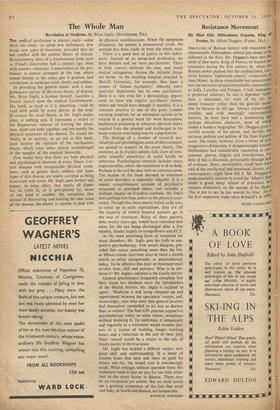Brian Inglis. (Hutchinson, 21s.) Revolution in Medicine. By TFIE medical
profession is always ready—some think too ready—to adopt new techniques, new drugs, new types of treatment, provided they do not conflict with the current theory of disease. Revolutionary ideas of a fundamental kind, such as Freud's discoveries half a century ago, meet with massive resistance. Conservatism in the pro- fession is always strongest at the top, where vested interest in the status quo is greatest, and revolutions in medicine come slowly and seldom.
In providing the general reader with a com- prehensive survey of the stress theory of disease, Mr. Brian Inglis, a layman himself, launches a frontal assault upon the medical Establishment. His book, as lucid as it is absorbing, could be read with profit by every doctor in the land. In essence the stress theory, as Mr. Inglis makes clear, is nothing new. It represents a return to the Hippocratic concept of treating the whole man, mind and body together, and not merely the physical symptoms of his disease. To accept the theory in its entirety, as set out in this book, must involve the rejection of the mechanistic theory which rules today almost unchallenged in the temples of the medical hierarchy.
Few would deny that there are both physical and psychological elements in every illness. Cer- tain diseases with recognisable physical symp- toms, such as gastric ulcer, asthma and some types of skin disease, are widely accepted as being associated with stress. Mr. Inglis goes farther and argues, to some effect, that nearly all illness has its roots in, or is precipitated by, stress of one kind or another. He complains that instead of discovering and treating the root cause of the disease, the doctor is content to deal with its physical manifestations. When the symptoms disappear, the patient is pronounced cured. No attempt has been made to treat the whole man.
There is a good deal of justice in this indict- ment. Instead of an integrated profession, we have doctors and we have psychiatrists. There is little contact between the two, and much mutual antagonism. Across the Atlantic things are better. At the teaching hospital attached to McGill University, for example, they have a system of 'liaison psychiatry,' whereby every specialist department has its own psychiatrist. Here it is rare even for a dermatology depart- . ment to have any regular psychiatric liaison, where one would have thought it essential. It is a common practice in one of the great London teaching hospitals for an attempted suicide to be treated in a general ward for wrist lacerations, barbiturate poisoning or whatever physical injury resulted from the attempt and discharged to his home without even being seen by a psychiatrist.
The findings of a number of research psy- chiatrists and psychologists, some of them eminent, are quoted in support of the stress theory. The evidence, as he frankly admits, falls short of com- plete scientific objectivity. It could hardly be otherwise. Psychological research includes many imponderables, where the statistician is of no help. Perhaps in the end the case rests on common sense. The section of the book devoted to treatment of stress disorders is especially valuable. It is a sound, comprehensive account of psychiatric treatment as practised today, and includes a brilliant chapter on Freudian methods. Mr. Inglis does perhaps less than justice to the physical treat- ments. Though they have mostly failed, as he says, to come up to early expectations, they are all the majority of mental hospital patients get in the way of treatment. Many of these patients who, twenty years ago, would have remained shut away for life are being discharged after a few months, thanks largely to tranquillisers and ECT.
As the most promising form of treatment for stress disorders, Mr. Inglis pins his faith to sup- • portive psychotherapy. Few would disagree, pro- vided this means something more than the ten- or fifteen-minute interview once or twice a month which so ofteri masquerades as psychotherapy today. To be effective this kind of treatment must involve time, skill and patience. Who is to per- form it? Mr. Inglis's solution is the family doctor.
General practitioners frequently complain that their status has declined since the introduction of the Health Service. Mr. Inglis is inclined to agree : 'Medicine is still being chopped up and apportioned between the specialists' camps; and, increasingly, men who enter into general practice find themselves compelled to act less as doctors than as sorters.' The best GPs practise supportive psychotherapy today to some extent, sometimes without knowing it. To undertake it consciously and regularly as a treatment would involve doc- tors in a course of training, longer working hours and a reduction in the size of their lists. Their reward would be a return to the role of family doctor in the true sense.
Mr. Inglis has tackled a difficult subject with great skill and understanding. If a sense of mission leads him here and there to push his theory too far, the broad case is convincingly made. What emerges without question from this important book is that we pay far too little atten- tion to the stress factor in disease. There may be no revolution yet awhile. But we shall surely see a growing acceptance of the fact that mind and body, in health and disease, are inseparable.
KENNETH ROBINSON


































 Previous page
Previous page